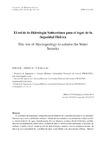Mostrar o rexistro simple do ítem
El rol de la hidrologia subterránea para el logro de la seguridad hídrica
| dc.contributor.author | París, Marta | |
| dc.contributor.author | Pérez, M. | |
| dc.contributor.author | D´Elía; M | |
| dc.date.accessioned | 2019-02-21T09:53:38Z | |
| dc.date.available | 2019-02-21T09:53:38Z | |
| dc.date.issued | 2018 | |
| dc.identifier.citation | Cadernos do Laboratorio Xeolóxico de Laxe: Revista de xeoloxía galega e do hercínico peninsular, ISSN 0213-4497, Nº 40, 2018, páxs. 103-122 | es_ES |
| dc.identifier.issn | 0213-4497 | |
| dc.identifier.uri | http://hdl.handle.net/2183/21905 | |
| dc.description.abstract | [Abstract] The concept of water security focuses on the objective of water management in society. However, in urban environments -where requirements related to water supply, floods, important rains, rising water tables, pollution problems, among others-, the lack of data and information appropriate to the scale of work, and even the inappropriate use of methodologies, attempt against any attempt to improve this capacity of the population to deal with critical situations. Even in the cities, it is more evident that the challenge of achieving a balance between the supply of water -finite, vulnerable and variable-, and an offer - tirelessly growing, of multiple users and interdependent-, forces us to “rethink” the hydrological cycle as a dynamic environmental system and with it, to add an interdisciplinary approach to hydrology. This paper presents the methodologies, results and conclusions that have served as the basis for improving knowledge of aquifer systems in the cities of Esperanza and Santa Fe (Argentina). The first supports its supply with groundwater, which is essential to protect the resource and the collection works. In the second case, the interrelation between surface and underground water is complex and requires that hydrodynamics of the system as a whole should be considered to define the best technological alternatives for urban infrastructure and the management of floods. The advances achieved point to the importance of science, as an engine that generates effective solutions for society to achieve the goals of sustainable development and water security. | es_ES |
| dc.description.sponsorship | [Resumen] El concepto de seguridad hídrica focaliza el objetivo de la gestión del agua en la sociedad. Sin embargo, en los ambientes urbanos -donde deben atenderse requerimientos relacionados al abastecimiento de agua, inundaciones, lluvias intensas, ascenso del nivel freático, problemas de contaminación, entre otros-, la falta de datos e información adecuadas a la escala de trabajo, e incluso el uso inapropiado de metodologías, atentan contra cualquier intento de mejorar esta capacidad de la población para hacer frente a las situaciones críticas. Incluso en las ciudades es más evidente que el desafío de lograr el equilibrio entre la oferta de agua –finita, vulnerable y variable-, y una oferta -incansablemente creciente, de múltiples usuarios e interdependiente-, obliga a “re pensar” el ciclo hidrológico como un sistema ambiental dinámico y con ello, a sumar a la Hidrología un enfoque interdisciplinar. En este trabajo se presentan las metodologías, resultados y conclusiones que han servido de base para mejorar el conocimiento de los sistemas acuíferos de las ciudades de Esperanza y Santa Fe (Argentina). La primera sustenta su abastecimiento con aguas subterráneas, con lo cual es indispensable la protección del recurso y las obras de captación. En el segundo caso, la interrelación entre el agua superficial y la subterránea es compleja y requiere que hidrodinámica del sistema en su conjunto deba ser considerada para definir las mejores alternativas tecnológicas de la infraestructura urbana y el manejo de las inundaciones. Los avances logrados señalan la importancia de la ciencia, como motor que genera soluciones efectivas para que la sociedad alcance las metas del desarrollo sostenible y la seguridad hídrica | es_ES |
| dc.language.iso | spa | es_ES |
| dc.subject | Hidrogeología | es_ES |
| dc.subject | Aguas subterráneas | es_ES |
| dc.subject | Argentina | es_ES |
| dc.subject | Gestión | es_ES |
| dc.subject | Seguridad hídrica | es_ES |
| dc.subject | Hydrogeology | es_ES |
| dc.subject | Groundwater | es_ES |
| dc.subject | Argentina | es_ES |
| dc.subject | Management | es_ES |
| dc.subject | Water security | es_ES |
| dc.title | El rol de la hidrologia subterránea para el logro de la seguridad hídrica | es_ES |
| dc.title.alternative | The role of hydrogeology to achieve the water security | es_ES |
| dc.type | info:eu-repo/semantics/article | es_ES |
| dc.rights.access | info:eu-repo/semantics/openAccess | es_ES |
| UDC.journalTitle | Cadernos do Laboratorio Xeolóxico de Laxe: Revista de xeoloxía galega e do hercínico peninsular | es_ES |
| UDC.volume | 40 | es_ES |
| UDC.startPage | 103 | es_ES |
| UDC.endPage | 122 | es_ES |






